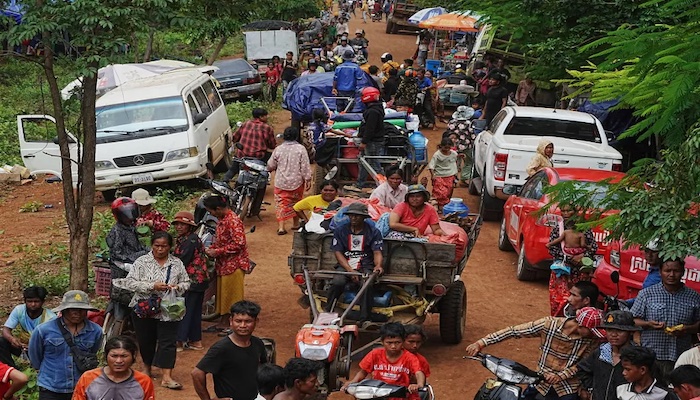Desperate Palestinians fleeing Israel’s expanding ground offensive crowded into an ever-shrinking area of the Gaza Strip as the Israel-Hamas war entered its third month Friday. The United Nations warned that its aid operation is “in tatters” because no place in the besieged enclave is safe.
Israel’s military assault on Gaza, a tiny, densely populated territory, has led to widespread civilian casualties and mass displacements, triggering international alarm.
The Israeli army said Friday that over the past day the military had struck about 450 targets in the Gaza Strip by air, sea and ground, signaling the continued intensity of its campaign. Palestinian TV stations reported airstrikes on various parts of the territory.
“Airstrikes and random artillery shelling have continued intensely since last night until this morning,” said Hassan Al Najjar, a journalist speaking by phone from northern Gaza.
Earlier this week, U.N Secretary-General Antonio Guterres used a rarely exercised power to warn the Security Council of an impending “humanitarian catastrophe,” and Arab and predominantly Muslim nations have called for a vote Friday on a Council resolution to demand an immediate cease-fire.
The United States, Israel’s closest ally, appears likely to block any U.N. effort to halt the fighting, which was triggered by the deadly Oct. 7 attack by Hamas militants on southern Israel. Still, U.S. concern over the devastation is growing. U.S. officials told Israel ahead of the expansion of its ground offensive to southern Gaza several days ago that it must limit civilian deaths and displacement, saying too many Palestinians were killed when it obliterated much of Gaza City and surrounding areas in the north.
On Thursday, U.S. Secretary of State Antony Blinken said in a call with Israeli Minister of Strategic Affairs Ron Dermer that casualties are still too high, a senior State Department official said. Blinken told Dermer that Israel must also do more to allow humanitarian aid into Gaza. The official spoke on condition of anonymity to discuss the private diplomatic discussion.
Israel insists it must crush the military capabilities of Hamas, which rules Gaza, and remove it from power following the group’s Oct. 7 attack.
In the first stage of the war, Israel’s air and ground campaign focused on the northern half of Gaza, leading hundreds of thousands of residents to flee south. Intense battles continued in parts of the north in recent days, while troops there have rounded up hundreds of Palestinian men.
In photos and video published Thursday, dozens of men are seen sitting in rows on a street in northern Gaza, stripped down to their underwear with their heads bowed as they are being guarded by Israeli troops.
The images were the first showing such detentions in the war. Israeli military spokesman Daniel Hagari said troops have detained and interrogated hundreds of people in Gaza suspected of militant links. U.N. monitors said troops reportedly detained men and boys from the age of 15 in a school-turned-shelter in the town of Beit Lahiya, in the north.
During the war, there has also been a dramatic surge in deadly military raids and an increase on restrictions on Palestinian residents in the occupied West Bank. Israeli forces stormed into a refugee camp in the West Bank on Friday to arrest suspected Palestinian militants, unleashing fighting with local gunmen in which six Palestinians were killed, health officials said. The Israeli military did not respond to a request for comment on the operation.
Over the past week, Israeli forces expanded their ground offensive into southern Gaza, with a focus on Khan Younis, the territory’s second largest city.
On Friday, the Palestinian Red Crescent Society said Israel’s air force attacked a home facing the society’s office in the city of Khan Younis in southern Gaza. It did not give details about casualties.
Medhat Abbas, a spokesperson for the Health Ministry in Hamas-controlled Gaza, reported a strike in the city of Deir al-Balah in central Gaza, saying it killed and wounded a number of people but gave no exact numbers.



























